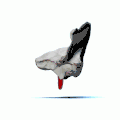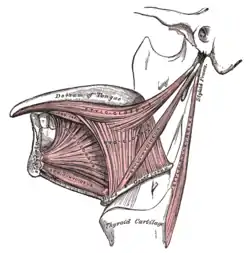Temporal styloid process
The temporal styloid process is a process of bone that extends down from the temporal bone of the human skull, just below the ear.
| Styloid process (temporal) | |
|---|---|
 Right side of the skull. Styloid process shown in red | |
_with_label.png.webp) Right temporal bone and mandible (styloid process labeled at bottom) | |
| Details | |
| Identifiers | |
| Latin | Processus styloideus ossis temporalis |
| TA98 | A02.1.06.047 |
| TA2 | 683 |
| FMA | 52877 |
| Anatomical terms of bone | |
Structure
The styloid process is a slender pointed piece of bone just below the ear. It projects down and forward from the inferior surface of the temporal bone, and serves as an anchor point for several muscles associated with the tongue and larynx.
- Its proximal part (tympanohyal) is ensheathed by the tympanic part of the temporal bone (vaginal process).
- Its distal part (stylohyal) gives attachment to the following:
- stylohyoid ligament
- stylomandibular ligament
- styloglossus muscle (innervated by the hypoglossal nerve)
- stylohyoid muscle (innervated by the facial nerve)
- stylopharyngeus muscle (innervated by the glossopharyngeal nerve)
The stylohyoid ligament extends from the apex of the process to the lesser cornu of the hyoid bone, and can sometimes be partially or completely ossified.
A small percentage of the population will suffer from an elongation of the styloid process and stylohyoid ligament calcification. This condition is also known as Eagle syndrome. The tissues in the throat rub on the styloid process during the act of swallowing with resulting pain along the glossopharyngeal nerve. There is also pain upon turning the head or extending the tongue. Other symptoms may include voice alteration, cough, dizziness, migraines, occipital neuralgia, pain in teeth and jaw and sinusitis or bloodshot eyes.
Development
The styloid process arises from endochondral ossification of the cartilage from the second pharyngeal arch.
Additional images
 Animation. Temporal styloid process shown in red.
Animation. Temporal styloid process shown in red. Left temporal bone.
Left temporal bone. Inferior surface of left temporal bone. Styloid process shown in red.
Inferior surface of left temporal bone. Styloid process shown in red. External and middle ear, opened from the front. Right side. (Label for styloid process is bottom center.)
External and middle ear, opened from the front. Right side. (Label for styloid process is bottom center.) Left temporal bone. Outer surface. (Styloid process visible at center bottom.)
Left temporal bone. Outer surface. (Styloid process visible at center bottom.) Articulation of the mandible. Medial aspect.
Articulation of the mandible. Medial aspect. Extrinsic muscles of the tongue. Left side.
Extrinsic muscles of the tongue. Left side. Dissection of the muscles of the palate from behind.
Dissection of the muscles of the palate from behind. Styloid process.Base of skull.
Styloid process.Base of skull.
References
![]() This article incorporates text in the public domain from page 145 of the 20th edition of Gray's Anatomy (1918)
This article incorporates text in the public domain from page 145 of the 20th edition of Gray's Anatomy (1918)
External links
- Anatomy photo:22:os-0407 at the SUNY Downstate Medical Center
- "Anatomy diagram: 25420.000-1". Roche Lexicon - illustrated navigator. Elsevier. Archived from the original on 2015-02-26.
- "Anatomy diagram: 34257.000-1". Roche Lexicon - illustrated navigator. Elsevier. Archived from the original on 2012-07-22.